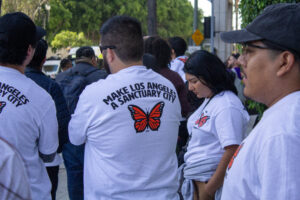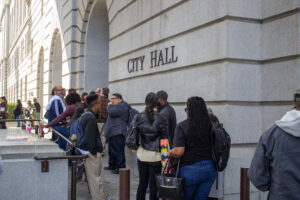- Slug: LA Sanctuary City. 670 words.
- Photos available (thumbnails, captions below).
By Brandelyn Clark
Cronkite News
LOS ANGELES – The Los Angeles City Council unanimously voted Tuesday to pass a new sanctuary city ordinance that aims to solidify protections for immigrant residents at risk of deportation.
City hall was abuzz with activity as supporters, many wearing T-shirts and holding signs with slogans like “Protect our neighbors” and “Make California a Sanctuary City,” gathered to advocate for the measure.
The ordinance formalizes the city’s status as a sanctuary for immigrants by prohibiting the use of city resources, personnel or property to assist federal immigration enforcement.
The law extends beyond existing policies, including LA Police Department’s Special Order 40, which was established in 1979 and banned officers from asking about immigration status or making arrests based solely on a migrant’s legal status.
Councilmember Kevin de León from Council District 14 had authored similar legislation in 2017 as a California senator and expressed why protecting the state’s migrant community was important in a statement before the council vote.
“I am the youngest child of a single immigrant mother with a third-grade education who came here as an undocumented immigrant and a woman who is just as American as anyone else,” de León said. “I want to raise my voice to support this measure.”
About 4.4 million immigrants reside within Los Angeles, and half are at risk for deportation, according to social justice nonprofit Vera Institute of Justice.
The new law introduces a provision allowing limited cooperation with federal authorities in cases involving serious offenses, such as violent felonies.
This compromise, introduced by Council President Marqueece Harris-Dawson, aligns with LAPD’s existing practices but has rarely been invoked in recent years, he said at Tuesday’s meeting.
The ordinance also prohibits direct or indirect data sharing with immigration authorities. City agencies must now audit and revise their internal protocols to ensure compliance with these regulations, which will go into effect once Mayor Karen Bass signs off.
The ordinance’s implementation could present logistical and legal challenges. City departments will need to train staff to comply with the law, particularly data sharing restrictions. Technology systems used by various agencies may also require updates to block unauthorized access by federal authorities.
The move comes amid rising tensions over federal immigration policies. Tom Homan, tapped as President-elect Donald Trump’s “border czar,” recently said “we’re going to take the handcuffs off ICE … they’re going to do the job,” on Fox News. Under Homan’s leadership the operation reinforces Trump’s promise for mass deportations.
Homan criticized sanctuary jurisdictions and hinted at increasing U.S. Immigration and Customs Enforcement resources in cities that resist cooperation, adding, “we’re going to do the job with you or without you.” He also suggested withholding federal funding from sanctuary cities as a potential strategy.
While supporters of the LA ordinance praised its role in protecting vulnerable communities, critics raised concerns about resource allocation, particularly given LA’s challenges with homelessness and housing.
As the city implements the sanctuary ordinance, it will likely serve as a national focal point for debates over immigration policy. Advocates see it as a model for cities that resist federal immigration crackdowns, while critics argue it may strain local resources and invite political retaliation.
City officials said Tuesday they are ready to address these tensions in the coming months while ensuring compliance with the new law. They added that public education campaigns may also be necessary to inform immigrant communities of their rights under the ordinance.
Jesus Carreon, a DACA recipient and law student, commented publicly at the meeting on Tuesday.
“I grew up in the shadows, constantly sharing separation from my loved ones, and have been sent back to a place we have fought so far to escape. My life has been marked by constant uncertainty, but I persevered because I believe in the promise of a better life,” Carreon said. “By passing this ordinance and making the city a sanctuary for immigrants, we send a message to every immigrant in the city that we are not alone, that we are valued, that we are worthy.”


